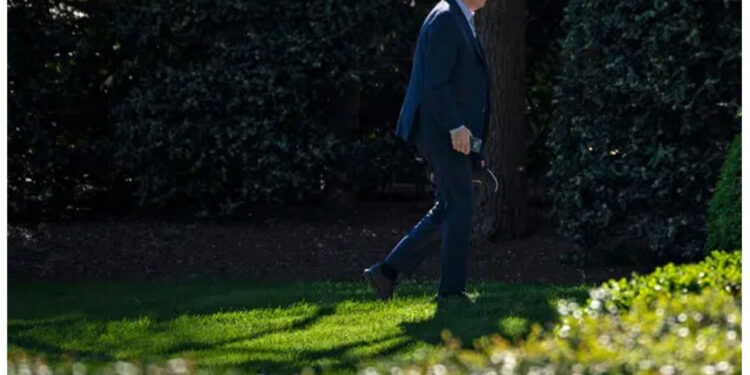President Joe Biden and his team are advising Israel that their successful defense against Iranian airstrikes is seen as a significant strategic victory. They are hopeful that this achievement will not necessitate further escalation or retaliation, in order to avoid a wider war in the Middle East, according to U.S. officials.
According to officials, Israel’s successful interception of over 300 drones and missiles on Saturday night showcased its superiority in the face of Iran’s aggression. This display of defensive capabilities not only proved Israel’s ability to protect itself and its American allies but also served as a deterrent, eliminating the need for immediate retaliation.
It is not immediately clear whether Prime Minister Benjamin Netanyahu of Israel and his government will agree to leave it at that. The attack caused relatively light damage, but the strikes surpassed the limited back-and-forth conflict between Iran and Israel in recent years. This crossed a red line as weapons were fired from Iranian territory into Israeli territory. If the defenses had not been effective, the outcome could have been much more severe, potentially resulting in numerous casualties.
Israeli officials were filled with strong emotions during their late-night phone calls with American partners. The pressure to retaliate was intense. U.S. officials, speaking anonymously to protect the sensitivity of the discussions, emphasized that the final decision rested with Israel. In response to two explosive drones sent by Hezbollah, an Iranian-backed militia, Israel launched airstrikes on Hezbollah-controlled structures in Lebanon. However, the direct connection between this retaliation and the earlier Iranian airstrike remains unclear.
In a phone call on Saturday, Biden reassured Netanyahu of his unwavering commitment to Israel’s security following the Iranian attack. Although the president did not disclose the specific advice he offered, a statement released after the call indicated his preference for exercising restraint.
“I conveyed to him that Israel has shown an impressive ability to protect itself and overcome even unprecedented assaults. This sends a strong message to its adversaries that they cannot pose a significant threat to Israel’s security,” stated Biden.
In response to the attack, he made a pledge to gather the leaders of the Group of 7 major industrial democracies on Sunday. The purpose of this gathering is to synchronize a “united diplomatic response,” which reflects his favored approach. Additionally, there will be an emergency session held by the United Nations Security Council on Sunday.
The conflict between Israel and Iran occurred during a period of heightened tension between Biden and Netanyahu. In a recent phone call, the president warned that he would reconsider his support for Israel’s military campaign in the Gaza Strip unless Netanyahu took steps to alleviate the suffering of civilians in the area. This marked the first time that American support had been used as leverage since the Hamas-led terrorist attack on Israel on October 7th.
While the two leaders were engaged in a conflict, Israel conducted an airstrike on the Iranian Embassy complex in Damascus, Syria. The strike resulted in the deaths of seven Iranian officers who were involved in covert operations. This incident posed a threat to the anticipated escalation that President Biden had been concerned about. However, despite this development, the president reaffirmed his unwavering support for Israel’s security and issued a warning to Iran not to retaliate.
American and Israeli officials have been closely collaborating to plan military operations in the event that Iran takes action. In response, President Biden has deployed aircraft and ballistic missile defense destroyers to the region. The outcome of these efforts has been highly successful, with U.S. and Israeli forces successfully intercepting and neutralizing numerous threats from Iran. This includes the impressive feat of shooting down over 100 ballistic missiles, which is considered by some officials to be an unparalleled achievement in military history. Additionally, Jordan has taken steps to protect its own security by intercepting projectiles that entered its airspace.
Iran, despite causing minimal tangible harm, has sent a clear signal that it is willing to de-escalate the situation following the strike on Saturday night. The Iranian mission to the United Nations stated, “The matter can be considered resolved.” However, they cautioned that if Israel were to make another error, Iran’s response would be significantly more severe. They emphasized that the conflict is between Iran and the rogue Israeli regime, and the United States should steer clear of it.
Iran’s intentions to attack were evident for more than a week, as they openly announced the launch of drones hours before they reached Israeli territory. This advance notice allowed ample time for defenses to prepare and respond. Some analysts believe that Iran’s display of force was a way to save face after the killing of its officers, without seeking a full-blown war with Israel or the United States.
In 2020, there was a situation that brought back memories of when President Donald Trump made the decision to carry out an airstrike in Iraq. The purpose of the airstrike was to eliminate Gen. Qassem Soleimani, the leader of Iran’s powerful Quds Force within the Revolutionary Guard. In response, Iran launched missiles at heavily fortified U.S. bases in Iraq. Fortunately, the damage was limited, although approximately 100 U.S. military personnel sustained injuries. To make their point clear, Iran sent a private message confirming that they had concluded their retaliatory actions. Surprisingly, President Trump decided not to retaliate further, and concerns about a potential cycle of escalating tensions began to subside.
In the days prior to the attack on Israel, Netanyahu issued a warning to Tehran, stating that they would retaliate against anyone who harmed them. However, since Israel did not sustain significant damage, Netanyahu may have some leeway to claim a win and shift focus. Israeli officials have not been explicit about their next steps.
“The Defense Minister, Yoav Gallant, stressed the importance of remaining vigilant and following the instructions provided by the IDF and Homefront Command. He emphasized the need to be prepared for any situation that may arise. However, he also highlighted the successful efforts in thwarting the most significant wave of attacks.”
The Americans argued that since Israel managed to eliminate those senior Iranian officers in Damascus without facing any major consequences two weeks ago, there may not be a need for another round of military action.












